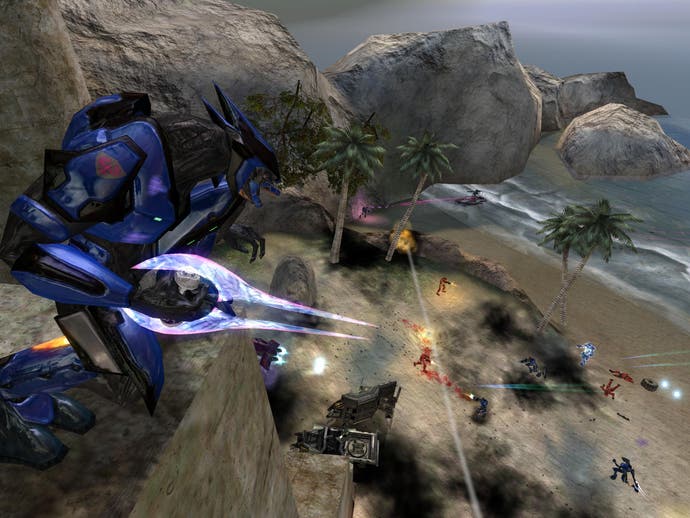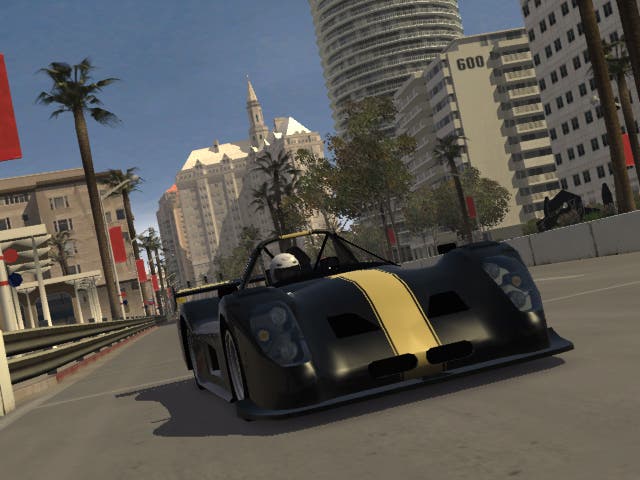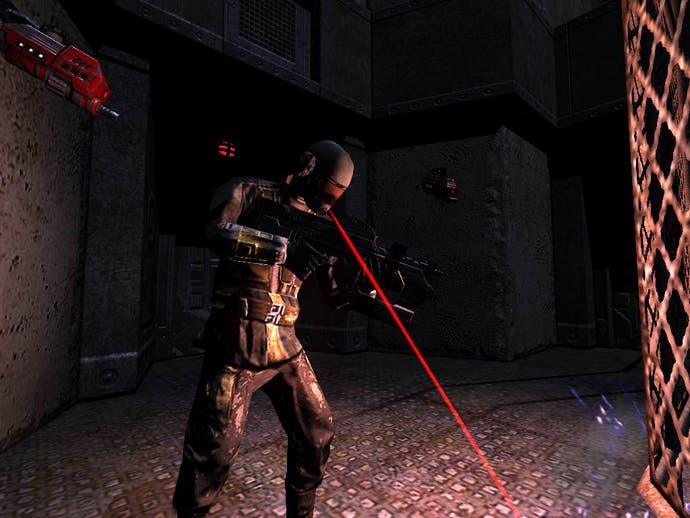The 12 Games of Xbox
Our favourite ever Xbox exclusives.
The Xbox is five years old today, and to celebrate we've compiled a list of the finest exclusive games ever to grace the system. Exclusive you say? Well, exclusive in Microsoft's terms of being 'console exclusive', so we didn't have to chuck out Halo or KOTOR, because they later came out on the beige box. But given that the Xbox was actually a PC in all but name, it's hardly surprising that there was a fairly fluid transition between the formats.
In fact, eagle-eyed readers will spot that half of this list came out on PC too, so it's as much a celebration of some of the best games of the past five years as what graced the Xbox.
1. Halo 1 and 2
- Halo 1 review
- Halo 2 review
- Xbox 360 compatible? Yes - both
What we said then:
Halo 1: 'Halo is very much a game of two halves. The first half is fast, exciting, beautifully designed and constantly full of surprises. The second half is festooned with gob smacking plot twists and great cinematics but let down by repetitive paint by numbers level design.'
Halo 2: 'It's a much more consistent, more exciting game than the original with far less of the moody tedium that blighted the middle section of the original.'
What we say now:
Kristan: Every console needs a truly great launch title, and Halo was every inch the classic system seller that inspired millions of gamers to put their money down on Microsoft's console. Building on the majesty of PC FPS classics like Half-Life and Unreal, it took the sci-fi atmosphere of the latter, the subtle narrative and AI of the former and delivered something that the console audiences had never seen before. And with superb co-op play, or competitive multiplayer over split screen or (far preferable) system link, it became one of the most enduring games of this console generation. The expectations surrounding the sequel were, understandably, sky high, and in terms of delivering the ultimate online multiplayer shooter for consoles, Bungie delivered. But Halo 2's single player offering had far less long-term impact, despite being initially an exciting new episode -and fans still haven't forgiven Bungie's decision to chop out the final third of the game in order to ship it on time. Nevertheless, the Halo series is still by far the Xbox's biggest and most important gaming franchise, and there's no question that the success of the console would have been very different without it.

Rob: Halo made the Xbox - without it, Microsoft would have had a much tougher struggle in the console market, and it's really telling that five years on, almost everyone would still rate the first game as one of its top titles. Unsurprisingly, Halo spawned countless imitators, and the market is awash with the corpses of space-marine-shoots-aliens games which simply didn't resonate with the gaming audience in the same way. The reason is clear; Halo wasn't just a success because people want to be a space marine and shoot aliens. The game was the complete package; it had stirring narrative, great characters, epic, sweeping scale, and absolutely fantastic, haunting music. It may not have brought much to the table in terms of gameplay innovation, and many PC FPS fans turned their noses up at it for that reason - but the production values and the understanding of how to create an involving, cinematic experience which Bungie brought to bear were unmatched. The sequel was disappointing and unfinished, and the focus on multiplayer ignored a large part of what made the first game so astonishingly successful - but there's no question in my mind that the franchise as a whole is a high point not just of the Xbox, but of the last five years of videogames.
How well has it aged?
First person shooters are constantly evolving, but it's quite a shock to see just how laughable some of the first Halo looks nowadays, with bland texture detail and some ropey character models leaping out at you right from the start. It's not all bad, though, with AI that still delights in comparison to some of the rubbish we've seen in some major league games this year, and some brilliant moments to enjoy. It's still worth digging out to experience that incredible first half all over again.
The second is definitely one of the nicest looking games from Xbox 1, with production values that, frankly, embarrass most of the games that currently claim to be 'next gen' - and looks better still running on the 360 on a big wide-screen HDTV if you've got the kit. Unsurprisingly, it's still the 360's most popular Live game, and still leaves most console online games for dust for the sheer flexibility on offer.
2. Project Gotham Racing 1 and 2
- Project Gotham Racing 1 review
- Project Gotham Racing 2 review
- Xbox 360 compatible? No - both
What we said then:
PGR1 'Devotees of Metropolis Street Racer will lap the game up interminably, and even a hardened GT and Ridge Racer nut like [Tom] found it hard not to be impaled by this Dark Knight's sceptre of entertainment'
PGR2 'This is a vast challenge. [It's] the best reason to subscribe to Xbox Live bar none, and, if you give it a chance, it still hooks in you faster than a fishing rod mounted on an Enzo Ferrari. PGR may be better in some senses, but any racing fan who doesn't buy this one is beyond redemption.'
What we say now:

Kristan: For all of the sci-fi glamour of Halo, the game I actually played more than all the others when the Xbox came out was Bizarre Creation's wonderful update of Dreamcast title Metropolis Street Racer. It was definitely Microsoft's gain when SEGA dropped out of the console hardware market in 2001, because it meant that it could sign up an already proven title, rebadge it, buff up the visuals, add an extra city and ensure that one of the best racing games ever was exclusive to its new system. With arguably the best visuals seen on a racing game and the extra allure of racing around real-life cities, it was playing tourist in some of the world's most desirable cars. With well-judged handling and the finely balanced Kudos system, it was simultaneously one of the most challenging and addictive racing games ever made -but maybe a little too hardcore for some tastes. The sequel, predictably, tweaked the progression system to make it easier for everyone to blitz through the game, but was nevertheless essential thanks to its incredible Xbox Live online play and vastly improved visual sheen.
Rob: Racing games never age well, and going back to PGR - or indeed to Metropolis Street Racer - is a sobering experience now, because in my mind, they looked so much better! Regardless, Bizarre Creations' games are truly fantastic - they stand head and shoulders above almost everything else in the racing genre, because they're involved and realistic enough to satisfy the hardcore market, while simultaneously being fun and visually appealing enough to be accessible for casual racing fans like me. It's a tough line to balance on but PGR makes it look effortless.
Tom: I've never actually crashed a car in real life, but the closest I've ever come was when I discovered that the turning circle at the end of my little cul-de-sac was iced over. I spent about five minutes doing donuts with the indicator going "clickclickclickclick" until the neighbours told me off. All three PGRs are ideal for me, whatever sort of mood I'm in - whether I want the stage by stage hunt for perfection; the traction-trashing fun of trying to skate around a track in one long kudos chain; the thrill of a massive online race; or just the aimless entertainment that one finds in wrestling a playful Ferrari around London with a manual transmission. It's been bettered in some senses by games released since (Test Drive Unlimited, in particular, presents an online world that PGR could have done with), but even so the Xbox originals remain playable today, and despite overlapping elements remain distinctive enough to be worth playing individually, too. As Rob sometimes points out, I was left so shell-like when I realised I'd finished the most recent one that I ended up smoking again, by which token PGR is the only series where I've actually had to resort to self-harm in order to maintain a buzz once the credits roll. Please invite me round to play number four, Bizarre - I won't tell anyone!
How well has it aged?
Unspectacularly. Five years on from PGR 1, it's hardly surprising that it has been surpassed in every sense, but it was built on pretty solid foundations so is perfectly acceptable. PGR 2 was a decent leap forward but did seem to stress the system rather too much, with some frame rate issues spoiling the fluidity at times. We're still slightly suspicious that Microsoft hasn't managed to make either of these games compatible with the 360 -especially as it's the second best-selling series on the system.
3. The Chronicles of Riddick: Escape from Butcher Bay
- The review
- Xbox 360 compatible: No
What we said then:
'There's a moral obligation to at least try [this]out. For a licensed game to end up being one of the best released [in 2004] is something to celebrate, and other publishers should take note - there really is no excuse for licensed rubbish any more. Riddick deserves to mark the pivotal moment when movie games changed forever.'
What we say now:

Rob: Actually, the Riddick movie was a bit of a guilty pleasure for me - epic scale science fiction schlock gets me every time. However, the game's pleasures are in no way guilty. Reducing the scale of the action to a prison break-out, Escape from Butcher Bay delivered a visceral, gritty, and absolutely stunning game that chopped up elements of first-person shooter, brawler and stealth games and mixed them together perfectly. Dark, moody, violent and claustrophobic, it's like Halo's evil twin - and makes us very excited indeed about the next thing that developers Starbreeze do.
Tom: I still have fond memories of creeping around the prison shanking people, dodging weird dreadnought mech things out of Warhammer and then playing nice in front of the guards whistling. Plus, restoring health involved sticking needles in Vin Diesel: excellent.
How well has it aged?
Given how new some of the techniques Starbreeze used at the time, very well. Buzzwords like 'Normal Mapping' are now well and truly part of the gaming lexicon, and as a result the environments still look fantastic, with excellent lighting and some decent character modeling going on. It's a real shame we can't see it in its full glory on 360 yet, but we'd happily play through it again once Microsoft's BC boys work their magic.

